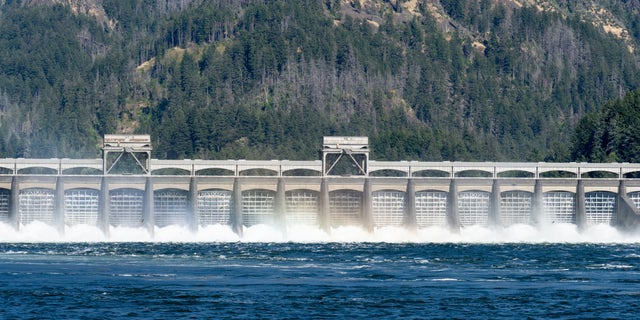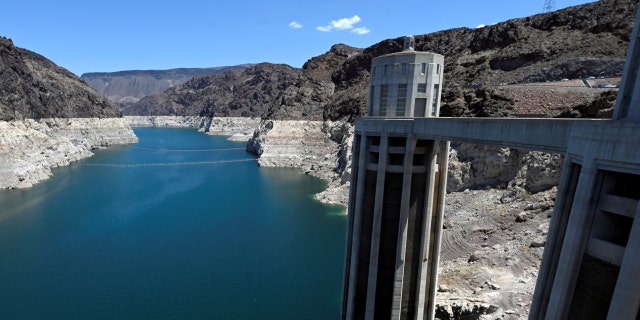Major US power source facing extinction thanks to red tape, sparking calls for reform
'This is an issue that needs to be addressed now,' top energy industry group tells Fox News Digital
The nation's top hydropower trade group and energy developers are raising the alarm on the burdensome regulatory process facing new and existing projects, warning a reliable source of electricity for millions is at risk.
Hydropower — which supplies nearly 80,000 megawatts of the nation's power, or 6.2% of total U.S. utility-scale electricity and 28.7% of total utility scale renewable electricity, according to federal data — remains a key part of the nation's growing power grid, but stakeholders argue it faces regulatory hurdles far greater than those facing other carbon-free sources of electricity.
"Our concern is that, without greater clarity on the licensing process, both how long it's going to take for the process and how much it's going to cost for the process, a lot of asset owners are simply going to decide to surrender their license," National Hydropower Association (NHA) President and CEO Malcolm Woolf told Fox News Digital in an interview.
 "What that means for the grid is a whole lot more instability just as we're adding variable wind and solar to the grid," he continued.
"What that means for the grid is a whole lot more instability just as we're adding variable wind and solar to the grid," he continued.BIDEN CONSIDERING TEARING DOWN KEY GREEN ENERGY SOURCE OVER ECO CONCERNS

The Bonneville Dam is pictured along the Washington-Oregon border. The facility provides enough electricity to power approximately 900,000 homes. (Marli Miller/UCG/Universal Images Group via Getty Images)
According to the Department of Energy, it takes developers of new hydro projects about five years on average to obtain an original license and operators of existing facilities nearly eight years to relicense. Further, up to 11 different federal agencies are involved in a typical hydropower licensing process including the Federal Energy Regulatory Commission which isn't involved in other renewable energy projects.
Meanwhile, about a third of the non-federal hydropower fleet has licenses that are set to expire by 2030 and another 20% between then and 2035. Woolf said without permitting reform that streamlines hydropower relicensing and licensing, facilities may be forced to shut down and energy developers may seek to invest elsewhere, jeopardizing the power of tens of millions of Americans.
BIDEN ADMIN OUTLINES PLAN TO CUT VITAL WATER SUPPLIES IN WESTERN STATES
"Now is when these companies are making the decisions about whether to relicense or not because they know that it's typically a seven or eight year process, but very often over a decade-long process," Woolf said. "For example, if there are concerns about the effect of a facility on a particular fish, you may need to do studies during multiple spawning seasons. All of those studies need to be complete before you submit your application that's due five and a half years in advance."
"So these decisions are being made now and an industry survey from last year showed that over a third of hydropower facility owners were actively considering decommissioning, considering license surrender," he added. "So, this is an issue that needs to be addressed now. It can't wait to future Congresses."


Lake Mead, a reservoir along the Nevada-Arizona border that feeds through the Hoover Dam in southern Nevada, is pictured on July 19, 2022. (REUTERS/David Becker)
Overall, about 90% of projects seeking original licenses abandon pursuit of a license prior to license issuance, a report published by National Renewable Energy Laboratory in 2021 determined. Generally, smaller existing facilities and proposed projects face the largest permitting hurdles, the report found.
But hydropower proponents note that renewable alternatives like solar and wind projects face a far less stringent permitting process and are intermittent, meaning they are highly dependent on favorable weather conditions. By comparison, hydropower is a dispatchable energy source and can be relied on to fill the gap during periods of high demand or low supply with operators.
"Wind and solar are great, but they're intermittent. We often use electricity when the sun is not shining or the wind is not blowing," Erik Steimle, the executive vice president of Florida-based energy developer Rye Development, said in an interview. "So, we need something that's reliable. And hydropower certainly is that — it's a 24/7 source of carbon-free electricity."
"It's no coincidence that areas of the United States that have some of the cheapest electricity are areas with a lot of hydropower that's existing."
US POWER GRID FACING ELEVATED RISK OF SHORTAGES THIS SUMMER AMID GREEN ENERGY PUSH: WATCHDOG
Rye Development is among the leading hydro developers in the U.S. and has proposed nearly two dozen projects, mainly in the mid-Atlantic region and South.
The company specializes in developing hydroelectric facilities where there is existing dam infrastructure — about 3% of the nation's dams can produce power — and closed-loop pump storage technology which generates power by transporting water back-and-forth between two man-made reservoirs. The U.S. has more than 23,000 megawatts of pumped storage capacity.


"It’s time to reform the process so we can keep this crucial energy source online," Clean Energy Czar John Podesta said this month. (Michael Brochstein/SOPA Images/LightRocket via Getty Images)
"Hydropower is an extremely valuable resource, certainly where it's already in the system," Steimle told Fox News Digital. "And I think it's a missing component for a lot of energy systems, especially ones that are now grappling with how they're going to think about integrating wind and solar."
"And a big reason why hydro has been missing, or a lot of new hydro has been missing, is because the permitting timelines for it have been very long in comparison to other types of new energy projects that can be sited in a much shorter period of time," he continued.
While hydropower generated nearly 100% of renewable power nationwide for decades, it has recently been surpassed by wind power, and solar power has grown more than 420% over the last decade.
BIDEN'S LATEST CLIMATE ACTION THREATENS US POWER GRID, EXPERTS SAY
Peggy Beltrone, the public policy adviser at Idaho-based Cat Creek Energy, another clean energy developer, touted the benefits of pumped storage hydropower and criticized the permitting process. Cat Creek is developing a pumped storage project in southern Idaho which it says will have a capacity of 720 megawatts, but isn't projected to come online until 2028.
"The actual generation that comes out of a pump storage and what it does for the electrical system is very important because, as we retire fossil fuel plants, we need to have a technology that works in a similar way and brings to the grid similar services," Beltrone told Fox News Digital.
"But there are more federal agencies that regulate hydropower licensing than nuclear power licensing," she said. "So, we're in favor of attempting to streamline."


"Hydro is an affordable, reliable and clean energy source, and as energy prices remain high, we need to encourage and support new hydro projects by streamlining the permitting process," Sens. Steve Daines, R-Mont., tells Fox News Digital. (Drew Angerer/Getty Images)
The warning from hydropower developers comes amid energy permitting reform talks on Capitol Hill which lawmakers argue is necessary to ensure companies are able to develop all forms of energy quicker and more efficiently. Senate Democrats and Republicans have recently floated competing proposals and are actively negotiating a compromise.
And the White House outlined its permitting priorities in a fact sheet this month that included streamlining hydropower. White House Clean Energy Czar John Podesta remarked that fixing the fix the cost and delays "bogging down the licensing process for hydropower projects" was necessary to keep the energy source onl
In addition, on May 10, Sens. Steve Daines, R-Mont., and Maria Cantwell, D-Wash., introduced bipartisan legislation to expedite hydro licensing, a bill the lawmakers hope will be attached to any final energy permitting package. The NHA, Podesta and a number of other stakeholders endorsed the legislation.
"Hydro is an affordable, reliable and clean energy source, and as energy prices remain high, we need to encourage and support new hydro projects by streamlining the permitting process to take advantage of this rich resource," Daines said in a statement to Fox News Digital.
"A balanced energy portfolio that includes hydropower is good for our communities, good for our pocketbooks and good for American energy jobs."
No comments: